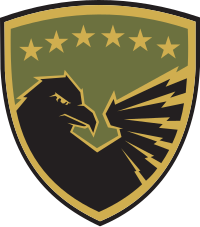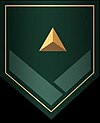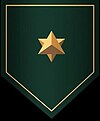Kosovo Security Forces
|
|||

|
|||
| guide | |||
|---|---|---|---|
| Commander in Chief : | President of Kosovo Hashim Thaçi | ||
| Defense Minister: | Anton Quni | ||
| Military Commander: | Lieutenant General Rahman Rama | ||
| Military leadership: | General Staff | ||
| Headquarters: | Pristina | ||
| Military strength | |||
| Active soldiers: | 5000 | ||
| Reservists: | 2500 | ||
| Conscription: | abolished | ||
| Resilient population: | 1,300,540 aged 16-49 (as of 2014). | ||
| Eligibility for military service: | 18 years of age | ||
| Share of soldiers in the total population: | 0.30% | ||
| household | |||
| Military budget: | ≈ € 90.5 million (2017) | ||
| Share of gross domestic product : | 0.90% (2017) | ||
| history | |||
| Founding: | January 21, 2009 | ||
The security forces of Kosovo ( Albanian Forca e Sigurisë së Kosovës (FSK) , also Kosovar Army , Albanian Ushtria e Kosovës ) are the armed forces of the Republic of Kosovo . They were established on January 21, 2009 and include 5,000 active soldiers and 2,500 reservists . The government of Kosovo is thus fulfilling an obligation from the plan of UN negotiator Martti Ahtisaari , which is the basis of the constitution of the young state.
The armed forces are subordinate to the Ministry of Defense , which was founded in 2008, and are expected to have at least ten percent non-Albanian members. The first commander of the "Kosovo Army" was Sylejman Selimi , former commander of the "Kosovo Liberation Army" UÇK and the Kosovo Protection Corps (TMK) , which was formally dissolved on January 20, 2009 .
The Parliament voted with a large majority (101 of 120 deputies) on 17 October 2018 three laws that enables the reform of the security forces in an army. The Serbian minority did not take part in the vote and left parliament. The minority party and the government of Serbia believe that the establishment of an army is unacceptable and would create instability in the region. On December 14, 2018, under a boycott of the representatives of the Serbian minority, the Kosovar parliament decided to transform the security forces into a regular army. Russia condemned the parliamentary decision as a violation of UN Security Council resolutions .
As of 2018, around 4030 soldiers from the NATO military mission KFOR , 4700 police officers from the United Nations Interim Administration Mission in Kosovo (UNMIK) and around 800 forces from EULEX Kosovo were deployed in Kosovo .
history
After the end of the Kosovo war in 1999, the United Nations Security Council authorized the Secretary General of the United Nations by resolution 1244 to establish the United Nations Interim Administration Mission in Kosovo (UNMIK) in Kosovo . The security should be carried out by the NATO- led KFOR . KFOR entered Kosovo on June 12, 1999 under a UN mandate - two days after UN Resolution 1244 was passed.
A kind of forerunner of a Kosovar army existed from 1999 to 2009 with the so-called Kosovo Protection Corps (TMK), which, however, was intended for civilian purposes.
On March 19, 2008 the then President of the USA , George W. Bush , authorized military aid for the security forces of Kosovo in a further step towards the establishment of formal relations with the recently independent state.
On January 4, 2009 the names of the people who were taken over by the Kosovo Protection Corps (TMK) into the FSK became known. After the dissolution of the TMK on January 20, 2009, the Forca e Sigurisë së Kosovës (FSK) was officially founded one day later . In fact, it is a successor organization, but in principle there should be no personal continuity with the TMK. There was also a recruiting process based on advertisements, which was completed by the end of 2009.
Serbia protested vigorously against the establishment of the FSK , in the opinion of the Serbian government this will consolidate what is illegitimate from the Serbian point of view, and it also violates the valid resolutions of the UN Security Council on Kosovo.
The Kosovo security forces have mentors from different nations who participate in KFOR. Uniforms were procured by the USA and Germany provided vehicles. The FSK should be set up in accordance with NATO standards. Italy, Portugal and other NATO member states also help the FSK with donations and training.
The following staff officers took their oath on June 16, 2009 under the supervision of the then FSK commander Lieutenant General Sylejman Selimi :
- Lieutenant General Rrahman Rama - Deputy Commander and commander of the country Force Command
- Major General Kadri Kastrati - Director of Operations
- Brigadier General Bashkim Jashari - Inspector General of the FSK
- Brigadier General Nazmi Brahimaj - Commander of the Rapid Reaction Brigade
- Brigadier General Zymer Halimi - Chief of Operations and Training
- Brigadier General Imri Ilazi - Commander of the Operations Support Brigade
- Brigadier General Enver Cikaqi - Commander of Training and Doctrine Command
On September 15, 2009, after eight months of training with NATO instructors, the FSK started work with its first operational structures.
On November 22, 2011, due to the retirement of Lieutenant General Sylejman Selimi, a change of command took place. The President of Kosovo Atifete Jahjaga appointed Major General Kadri Kastrati , Director of Operations, Commander of the FSK, and on January 25, 2012, promoted him to the rank of Lieutenant General.
Mission statement and tasks
The Kosovo security forces are a multiethnic, lightly armed and uniformed force subject to democratic civilian control.
The task of the FSK consists in:
- Crisis response in and outside Kosovo
- Protection of the civilian population within Kosovo
- Assisting civil authorities in natural disasters and other emergencies
Such duties include SAR operations , bomb disposal, mine clearance , dangerous goods operations, fire fighting and other humanitarian support tasks.
The Ministry of Security Forces of Kosovo is responsible for the implementation of civilian oversight of the security forces of Kosovo - including management and administration. It consists of civilian and military personnel and is accountable to the Kosovo Parliament through the Prime Minister. The task of the ministry, which is also the highest staff of the FSC, is to formulate, implement, evaluate and develop the strategies and activities of the security forces within the framework of democratic leadership and in accordance with the constitution and the laws of the Republic of Kosovo.
uniform
On December 12, 2008, the badges, ranks and uniform of the Kosovo security forces were selected by national and international military experts. The FSK currently uses the Digital Field Uniform . A black beret with an FSK badge is worn with this combat suit .
Ranks
| Generals | |||
|---|---|---|---|

|

|

|
|
| radhë | Gjenerallejtënant | General major | General Brigade |
| Rank | Lieutenant General | Major general | Brigadier General |
| Staff officers | Officers | |||||
|---|---|---|---|---|---|---|

|

|

|

|

|

|
|
| radhë | Colonel | Nënkolonel | major | Captain | Toger | Nëntoger |
| Rank | Colonel | Lieutenant colonel | major | Captain | First lieutenant | lieutenant |
| NCOs | Teams | |||||
|---|---|---|---|---|---|---|

|

|

|

|

|

|
|
| radhë | Rreshter i parë | Rreshter major | Kapter | Rreshter | Tetar | Ushtar |
| Rank | Sergeant Major | Hauptfeldwebel / Stabsfeldwebel | Sergeant / Oberfeldwebel | NCO / Staff NCO | Corporal | Private |
headquarters
- 3 headquarters in Pristina
- 2 headquarters in Prizren
- 3 headquarters in Gjilan
- 1 headquarters in Ferizaj
- 1 headquarters in Mitrovica
- 1 headquarters in Peja
- 1 headquarters in Istog
- 1 headquarters in Fushë Kosova
- 1 training airfield in Gjakova
equipment
The training of the FSK is directed by British army officers . The troops are armed with small arms .
vehicles
The security forces of Kosovo currently only have several unarmored and armored transport vehicles, mainly of German origin. In 2014 Turkey donated 20 Otokar Cobra armored vehicles .
| vehicle | origin | Type | version | number |
|---|---|---|---|---|
| Mercedes-Benz NG |
|
Truck 5t | 1017A | 300 |
| MB Wolf |
|
Off-road vehicle | Truck 0.9t | 200 |
| VW Transporter |
|
Vans | T3 | 200 |
| Unimog |
|
Truck 3t | 416 / 435 | 50 |
| MAN gl |
|
Truck 10t | 4520 | 50 |
| Otokar Cobra |
|
Light armored car | Version I. | 500 |
| Humvee |
|
hardened vehicle | 25th | |
| Land Rover |
|
hardened vehicle | 100 |
weapons
The used by the KLA heavy weapons systems, such as type-59 tanks , howitzers , Stinger- and Strela-2 - MANPADS , various types of modern Western and Soviet anti-tank missile and recoilless guns , mortar mm with different calibers (60, 82 mm, 120 mm, and 160 mm) were either smuggled back to Albania for storage or to Macedonia for armament. Most of these weapon systems came from the black market or were donated by Albanian generals. The same fate befell the anti-tank guided weapons, artillery pieces, mortars and recoilless guns captured by the Serbs.
When it comes to hand weapons, the security forces in Kosovo have access to a large arsenal, which also includes weapons that are not included in the list. Most of these weapons were acquired during and after the Kosovo War and most of them were not officially introduced into the military due to the conditions set out in the Ahtisaari Plan. Therefore, these weapons are mainly stored in armories as reserves. They are also in the hands of government-linked paramilitary groups.
Pistols, submachine guns and sniper rifles
The Glock 17 is the standard pistol used by the Kosovo security forces.
| weapon | origin | Type | caliber |
|---|---|---|---|
| Glock 17 |
|
Self-loading pistol | 9 × 19 mm |
| M84 scorpion |
|
Submachine gun | 7.65 x 17 mm |
| HK MP5 |
|
Submachine gun | 9 × 19 mm |
| ERO |
|
Submachine gun | 9 × 19 mm |
| PSL |
|
Sniper rifle | 7.62 × 54 mm |
| Dragunow SWD |
|
Sniper rifle | 7.62 × 54 mm |
| Zastava M76 |
|
Sniper rifle | 7.92 x 57 mm |
Assault rifles and carbines


In 2010, the decision was made to equip the Kosovo security forces with a new standard infantry weapon. The choice fell on the G36 from Heckler & Koch . A total of 3000 rifles of this type were ordered, the first delivery of 375 assault rifles of this type took place in June 2010. The Zastava M59 / 66 carbine is only used by the honor guard and the M4 by the FSK Police Force (PF) .
| weapon | origin | Type | caliber |
|---|---|---|---|
| AK-47 / AKS-47 |
|
Assault rifle | 7.62 × 39 mm |
| AKM / AKMS |
|
Assault rifle | 7.62 × 39 mm |
| ASH-82 |
|
Assault rifle | 7.62 × 39 mm |
| 805 Bren |
|
Assault rifle | 5.56 x 45 mm |
| Zastava M70 |
|
Assault rifle | 7.62 × 39 mm |
| AK SOPMOD |
|
Assault rifle | 7.62 × 39 mm |
| M16 |
|
Assault rifle | 5.56 x 45 mm |
| HK G36 V |
|
Assault rifle | 5.56 x 45 mm |
| Zastava M59 / 66 |
|
Carabiner | 7.62 × 39 mm |
| M4 SOPMOD |
|
Carabiner | 5.56 x 45 mm |
Grenade launchers and anti-tank weapons
| weapon | origin | Type | caliber |
|---|---|---|---|
| M203 |
|
Grenade launcher | 40 mm grenade |
| AG36 |
|
Grenade launcher | 40 mm grenade |
| Metallic RBG-6 |
|
Grenade launcher | 40 mm grenade |
| RPG-7 |
|
Reactive anti-tank rifle | 40 mm grenade |
| M72 LAW |
|
Grenade weapon | 66 mm grenade |
| M80 Zolja |
|
Grenade weapon | 64 mm grenade |
| M79 Osa |
|
Grenade weapon | 90 mm grenade |
Machine guns
| weapon | origin | Type | caliber |
|---|---|---|---|
| ASch-78 (Tip-2) |
|
Machine gun | 7.62 × 39 mm |
| PK |
|
Machine gun | 7.62 × 54 mm |
| RPD |
|
Machine gun | 7.62 × 39 mm |
| Zastava M72 |
|
Machine gun | 7.62 × 39 mm |
| Zastava M84 |
|
Machine gun | 7.62 × 54 mm |
| Browning M2 |
|
Heavy machine gun | 12.7 x 99 mm |
| DSchKM |
|
Heavy machine gun | 12.7 x 108 mm |
Calls
In December 2010, soldiers from the Kosovo security forces provided aid in flooded areas in northern Albania near the city of Shkodra , where they were instrumental in rescuing, evacuating and providing medical care for the local population. The FSC were used to provide emergency humanitarian aid at the request of the Albanian government.
In July 2011, an 11-person team from Kosovo's security forces took part in the four-day Nijmegen March . In addition to the mandatory medals and certificates for the performance of each individual soldier, the Kosovars received the award for the best team. According to the organizers, it was the first time in the 95-year history of the march that every participant of a team had completed the march.
Web links
- Ministry of the Security Forces of Kosovo
- KSF report 2010 (PDF file; 2.4 MB)
- KSF report 2011 (PDF file; 5.7 MB)
- A para-army for Kosovo. DW World, January 21, 2009.
Individual evidence
- ↑ [1] , accessed on July 27, 2010
- ↑ Kosovo: President confirms establishment of his own army with the help of NATO and the USA , accessed on September 17, 2017
- ↑ Kosovars have their own army , Der Standard, January 21, 2009
- ↑ Kosovo begins to build an army. In: n-tv . October 19, 2018, accessed November 1, 2018 .
- ↑ Kosovo gets its own army. In: Deutsche Welle . October 19, 2018, accessed November 1, 2018 .
- ↑ Kosovo is taking the first steps towards establishing its own army. In: Neue Zürcher Zeitung . October 19, 2018, accessed November 1, 2018 .
- ↑ aev / AFP / dpa: Kosovo builds its own army. In: Spiegel Online . December 14, 2018, accessed April 17, 2020 .
- ↑ Bush OKs supplying arms to Kosovo ( Memento of March 24, 2008 in the Internet Archive ), AFP, March 19, 2008.
- ^ "Italy to support the establishment of Kosovo armed forces" ( Memento of the original from April 1, 2012 in the Internet Archive ) Info: The archive link was automatically inserted and not yet checked. Please check the original and archive link according to the instructions and then remove this notice. newkosovoareport.com 24 December 2008. Link accessed 21-01-09
- ↑ "Portugal to assist the establishment of Kosovo Army" ( Memento of the original from June 4, 2009 in the Internet Archive ) Info: The archive link was inserted automatically and has not yet been checked. Please check the original and archive link according to the instructions and then remove this notice. newkosovoareport.com December 20, 2008.
- ^ Ministry Press Release , June 16, 2009, Pristina
- ↑ FSK nis zyrtarisht punën ( Albanian ) Gazeta Express. September 18, 2009. Archived from the original on May 2, 2014. Info: The archive link was automatically inserted and not yet checked. Please check the original and archive link according to the instructions and then remove this notice. Retrieved September 18, 2009.
- ^ Kadri Kosovo Security Force Gets New Commander , November 23, 2011, Pristina
- ↑ US Ambassador remarks KSF Change of Command ( Memento of the original from February 15, 2013 in the Internet Archive ) Info: The archive link was inserted automatically and has not yet been checked. Please check the original and archive link according to the instructions and then remove this notice. , November 22, 2011, Pristina
- ↑ Presidentja e Kosovës gradon në gjenerallejtënant Komandantin e FSK-së ( Albanian ) MKSF. January 25, 2012. Retrieved February 1, 2012.
- ↑ Kosovo Security Force helps Albania manage floods
- ↑ Interview with Lieutenant General Kadri Kastrati , January 5, 2012, Pristina
- ↑ KSF team at the Nijmwegen march




